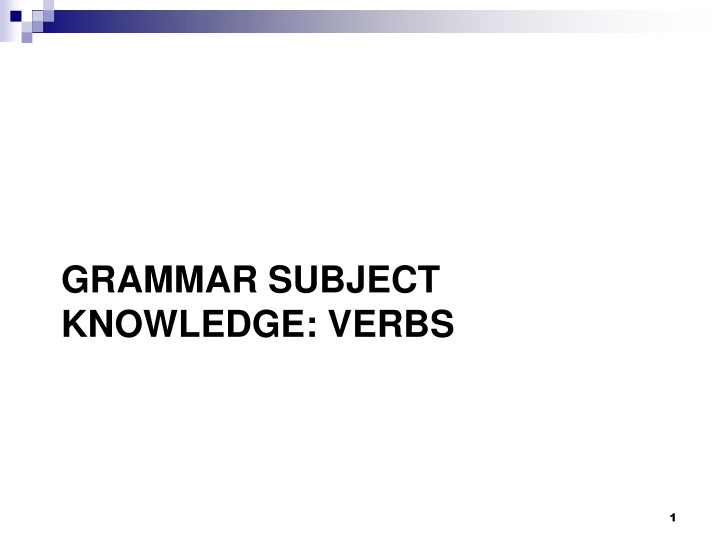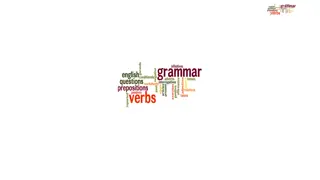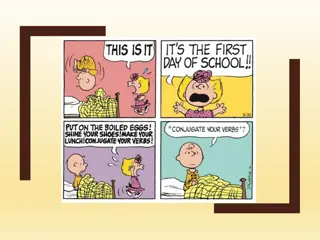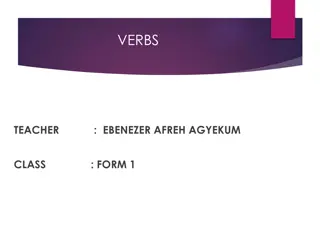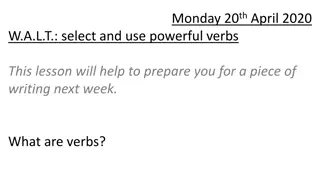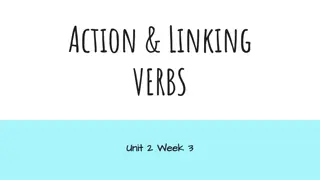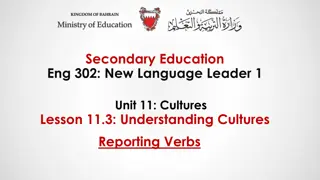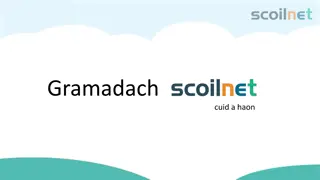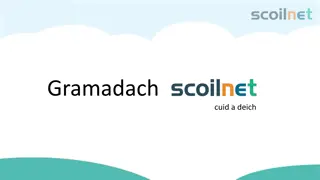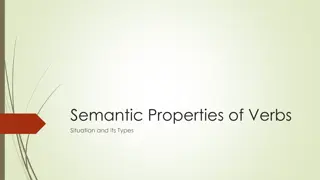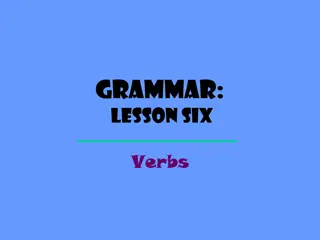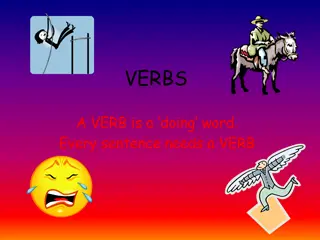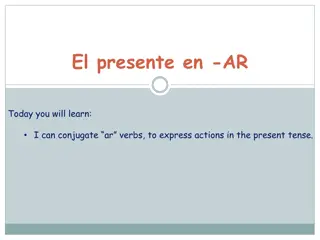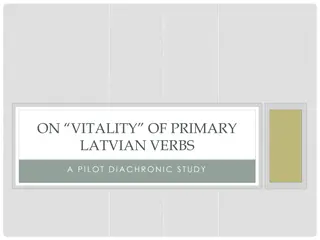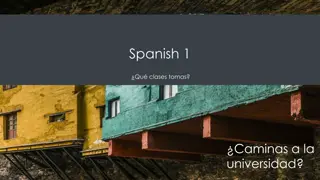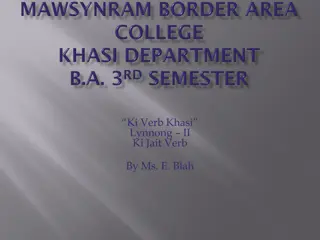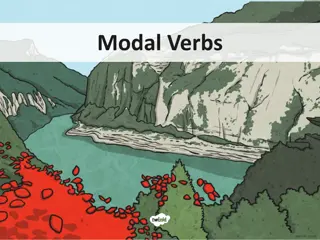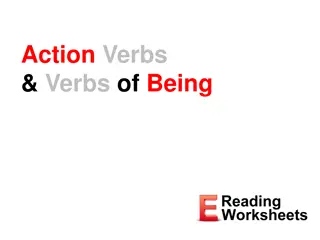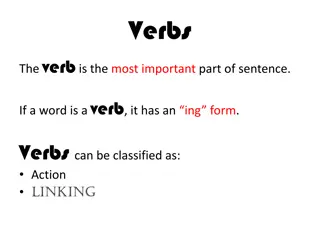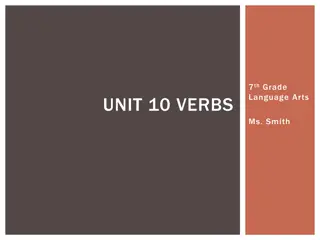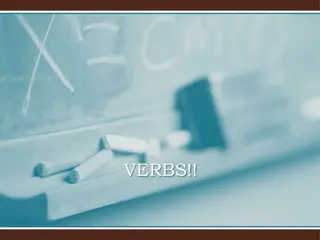Identifying Verbs in a Narrative
In this narrative excerpt, we follow a protagonist's encounter in a garage on a Sunday afternoon, unveiling mysterious events and characters. By identifying the verbs used, we delve into the actions, movements, and emotions depicted in the story, creating a vivid picture of the scene and characters involved. Through lexical and main verbs, we unravel the unfolding events and characters' interactions, setting the stage for a captivating narrative journey.
Download Presentation

Please find below an Image/Link to download the presentation.
The content on the website is provided AS IS for your information and personal use only. It may not be sold, licensed, or shared on other websites without obtaining consent from the author.If you encounter any issues during the download, it is possible that the publisher has removed the file from their server.
You are allowed to download the files provided on this website for personal or commercial use, subject to the condition that they are used lawfully. All files are the property of their respective owners.
The content on the website is provided AS IS for your information and personal use only. It may not be sold, licensed, or shared on other websites without obtaining consent from the author.
E N D
Presentation Transcript
GRAMMAR SUBJECT KNOWLEDGE: VERBS 1
Find the verbs I found him in the garage on a Sunday afternoon. It was the day after we moved into Falconer Road. The winter was ending. Mum had said we d be moving just in time for the spring. Nobody else was there. Just me. The others were inside the house with Doctor Death, worrying about the baby. He was lying there in the darkness behind the tea chests, in the dust and dirt. It was as if he d been there forever. He was filthy and pale and dried out and I thought he was dead. I couldn t have been more wrong. I d soon begin to see the truth about him, that there d never been another creature like him in the world. We called it the garage because that s what the estate agent, Mr Stone, called it. It was more like a demolition site or a rubbish dump or one of those ancient warehouses they keep pulling down at the quay. Stone led us down the garden, tugged the door open and shone his little torch into the gloom. We shoved our heads in at the doorway with him. From Skellig by Michael Morpurgo
Find the verbs I found him in the garage on a Sunday afternoon. It was the day after we moved into Falconer Road. The winter was ending. Mum had said we d be moving just in time for the spring. Nobody else was there. Just me. The others were inside the house with Doctor Death, worrying about the baby. He was lying there in the darkness behind the tea chests, in the dust and dirt. It was as if he d been there forever. He was filthy and pale and dried out and I thought he was dead. I couldn t have been more wrong. I d soon begin to see the truth about him, that there d never been another creature like him in the world. We called it the garage because that s what the estate agent, Mr Stone, called it. It was more like a demolition site or a rubbish dump or one of those ancient warehouses they keep pulling down at the quay. Stone led us down the garden, tugged the door open and shone his little torch into the gloom. We shoved our heads in at the doorway with him. From Skellig by Michael Morpurgo
Lexical (main) verbs I found him in the garage on a Sunday afternoon. It was the day after we moved into Falconer Road. The winter was ending. Mum had said we d be moving just in time for the spring. Nobody else was there. Just me. The others were inside the house with Doctor Death, worrying about the baby. He was lying there in the darkness behind the tea chests, in the dust and dirt. It was as if he d been there forever. He was filthy and pale and dried out and I thoughthe was dead. I couldn t have been more wrong. I d soon begin to see the truth about him, that there d never been another creature like him in the world. We calledit the garage because that s what the estate agent, Mr Stone, called it. It was more like a demolition site or a rubbish dump or one of those ancient warehouses they keep pulling down at the quay. Stone led us down the garden, tugged the door open and shone his little torch into the gloom. We shoved our heads in at the doorway with him.
Be or have as main (lexical) verbs I found him in the garage on a Sunday afternoon. It was the day after we moved into Falconer Road. The winter was ending. Mum had said we d be moving just in time for the spring. Nobody else was there. Just me. The others were inside the house with Doctor Death, worrying about the baby. He was lying there in the darkness behind the tea chests, in the dust and dirt. It wasas if he d been there forever. He was filthy and pale and dried out and I thought he wasdead. I couldn t have beenmore wrong. I d soon begin to see the truth about him, that there d never been another creature like him in the world. We called it the garage because that s what the estate agent, Mr Stone, called it. It was more like a demolition site or a rubbish dump or one of those ancient warehouses they keep pulling down at the quay. Stone led us down the garden, tugged the door open and shone his little torch into the gloom. We shoved our heads in at the doorway with him.
Be or have as auxiliary verbs I found him in the garage on a Sunday afternoon. It was the day after we moved into Falconer Road. The winter was ending. Mum hadsaid we dbe moving just in time for the spring. Nobody else was there. Just me. The others were inside the house with Doctor Death, worrying about the baby. He was lying there in the darkness behind the tea chests, in the dust and dirt. It was as if he d been there forever. He was filthy and pale and dried out and I thought he was dead. I couldn t havebeen more wrong. I d soon begin to see the truth about him, that there d never been another creature like him in the world. We called it the garage because that s what the estate agent, Mr Stone, called it. It was more like a demolition site or a rubbish dump or one of those ancient warehouses they keep pulling down at the quay. Stone led us down the garden, tugged the door open and shone his little torch into the gloom. We shoved our heads in at the doorway with him.
Modal verbs I found him in the garage on a Sunday afternoon. It was the day after we moved into Falconer Road. The winter was ending. Mum had said we [woul]d be moving just in time for the spring. Nobody else was there. Just me. The others were inside the house with Doctor Death, worrying about the baby. He was lying there in the darkness behind the tea chests, in the dust and dirt. It was as if he d been there forever. He was filthy and pale and dried out and I thought he was dead. I couldn thave been more wrong. I [woul]d soon begin to see the truth about him, that there d never been another creature like him in the world. We called it the garage because that s what the estate agent, Mr Stone, called it. It was more like a demolition site or a rubbish dump or one of those ancient warehouses they keep pulling down at the quay. Stone led us down the garden, tugged the door open and shone his little torch into the gloom. We shoved our heads in at the doorway with him.
Teacher Knowledge It does help you in your work with children if you understand the difference between main (lexical) and auxiliary verbs, including modal verbs. . I dance I am dancing I danced I was dancing I had danced I could have danced I might be dancing I should have been dancing The verb phrase can be a single word or a string of verbs one after another I is a pronoun: not part of the verb phrase but here to help the examples make sense 9
Teacher Knowledge It does help you in your work with children if you understand the difference between main (lexical) and auxiliary verbs, including modal verbs. . The main (lexical) verb: this is often the doing verb. It is the main verb in the phrase and the one you d look up in a dictionary I dance I amdancing I danced I wasdancing I haddanced I could have danced I might be dancing I should have been dancing Look at the position of the main verb: it is either on its own or last in the verb phrase 10
Teacher Knowledge It does help you in your work with children if you understand the difference between main and auxiliary verbs, including modal verbs. . I dance I am dancing I danced I was dancing I had danced I could have danced I might be dancing I should have been dancing The auxiliary verb: It helps to create shades of meaning in the verb phrase and is usually formed with variations of be or have, but sometimes with do or get 11
Teacher Knowledge It does help you in your work with children if you understand the difference between main and auxiliary verbs, including modal verbs. I dance I am dancing I danced I was dancing I had danced I couldhave danced I mightbe dancing I shouldhave been dancing The modal verb: expresses shades of possibility and certainty Modal verbs are one kind of auxiliary verb 12
Key knowledge about verbs The verbs be and have are very common (but are not doing words!) and all children should be able to recognise these from an early stage; Verbs occur in text in verb phrases which can be one word (The others were inside) or a string of verbs one after another (I couldn t have been more wrong): children need to be able to recognise these strings as one unit of meaning; The only kind of word which can be found within a verb phrase is an adverb, usually not or never (I couldn t have been more wrong) The concept of main verb and auxiliary verb may be helpful for children to understand as they develop in their grammatical knowledge: Main lexical verb: the verb that stands as a single word in a clause or the last word in a verb phrase The others were inside; They were worrying about the baby Auxiliary verb: the verbs which precede the main verb in a verb phrase: I couldn t have been more wrong; they were worrying about the baby Modal verbs are one kind of auxiliary verb 13
VERBS: BUILDING STUDENTS UNDERSTANDING 14
Slots in a clause Subject Verb Object Adverbial Complement (adjective/noun/noun phrase) Beauty waited. Gregor sat down and ate. Gregor ate bread greedily. Into a forest of fifty thousand trees rode a lone traveller. Overhead, the moon was a smoking mirror. Waiting at the door stood his three daughters.
The verb slot in a clause The verb is the powerhouse of a sentence or a clause, driving its meaning, The verb slot in a clause or sentence is often filled with a single word: Beauty waited. Gregor sat down and ate. Into a forest of fifty thousand trees rode a lone traveller. Under him his horse trembled with terror. Waiting at the door stood his three daughters. Loneliness smothered her like an eiderdown. She ate and played and walked alone, except for the occasional sound of breathing nearby. Lexical verbs like these carry the weight of meaning in a text, expressing actions, thinking, feeling or understanding.
The verb slot in a clause The verb slot in a clause or sentence is often a primary verb, a being or having word: Overhead, the moon was a smoking mirror. Hello. Is anybody there? There was no reply. There was the sour, green lawn pitching like the deck of a ship. There were the stable doors swinging. Am I not the ugliest sight you ever saw? Verbs that are forms of be and have can be the main verb in a clause or sentence, dictating past or present tense. It is very helpful for children to understand that be and have are verbs, and to recognise all the various forms of these verbs: am is are were was have has had been being be having
The verb slot in a clause The verb slot in a clause or sentence is often made up of more than one word: Who had lit the fire? You have plundered my house! Every corridor was lined with great gilded mirrors. Underneath his noble bearing and pleasant face was the same old Beast to whom Beauty had given her heart. Beauty waited but the Beast still did not eat her. He had not heard laughter for a hundred years. The Verbs that are forms of be and have (and do ) can be an auxiliary as well as a main verb, helping to form a verb phrase that creates different aspects of tense.
The verb slot in a clause The auxiliary do is common in questions: What do you want of me? she called out when footsteps echoed behind her, on the lightless stairs. Did the beast spare you? Does my face not disgust you? Modal verbs (shall, should, can, could, might, may, must, will, would) are auxiliaries, helping to form a verb phrase that creates different aspects of tense and expresses degrees of possibility or certainty. Oh, my girl Beauty would love these! he thought. How could he tell her? I ll be back before you even miss me, she said blithely. Beauty would have stayed only a day or two.
Recap: Primary Verbs Can act as both main verbs and auxiliary verbs Present Simple be have do Practise conjugating each verb in its singular and plural form, present tense: Sing. 2. you 3. it/he/she 1. I Plural 2. you 3. they 1. we
How many different versions of this sentence can you make, using the chart to create different aspects of tense? Beauty waited. Auxiliary is was has had have has been had been Modal may might can could will would must shall should Lexical/Main waits waited waiting
A quick check Find the verbs in the following sentences: I painted the beautiful scenery every morning. The house was very old. We had a tiny caravan in the garden. A figure was sitting on one of our garden features. The beaches are beautiful. You have seen Captain Vasey. Then off I would go to the cottage. You could have been dreaming. At least I could get some sleep there. A Word in Your Ear Tony Ross (2014)
A quick check I painted the beautiful scenery every morning. The house was very old. We had a tiny caravan in the garden. A figure was sitting on one of our garden features. The beaches are beautiful. You have seen Captain Vasey. Then off I would go to the cottage. You could have been dreaming. At least I could get some sleep there. Can you see from these examples how the idea that a verb is a doing word might be misleading for students? The verb slot in a clause can be filled with one or more words Auxiliary and modal verbs work with lexical verbs to form different aspects of the present and past Be, have and do are Primary Verbs they can act as either the lexical/main verb in a clause OR as an auxiliary The choice of verb, including the tense and aspect, enables the writer to express subtle shades of meaning 23
Grammatical Subject Knowledge Check that you are confident with the verb as a grammatical concept: including that: verbs can express being/having (be; have); thinking/feeling (dream; believe; expect) as well as the more obvious doing (jump; dance; eat) a sentence/clause may have a single verb or a verb phrase (a string of verbs) eg I raced into town I should have been taking more care. verbs can be lexical, modal or auxiliary: I raced into town I should have been taking more care lexical modal auxiliary Can you ensure that all children understand that be and have and all their variations are verbs? 24
